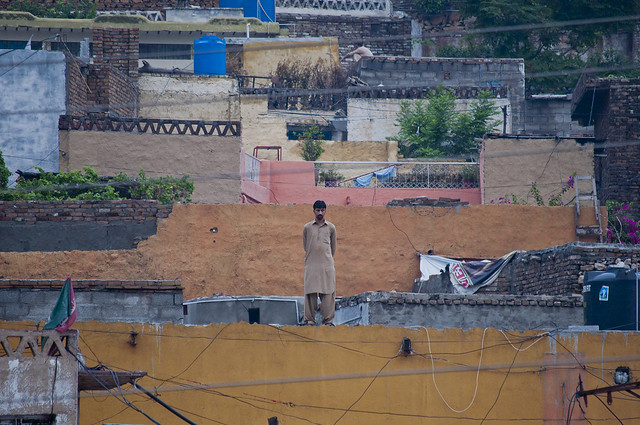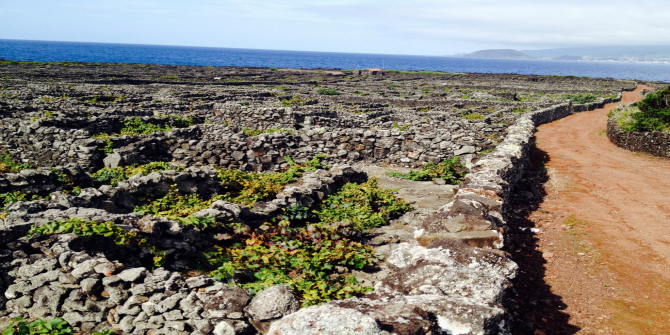Muslim Zion seeks to cut to the core of the geopolitical paradoxes entangling Pakistan to argue that it has never been a nation state in the conventional sense. It is instead a distinct type of political geography, ungrounded in the historic connections of lands and peoples, whose context is provided by the settler states of the New World but whose closest ideological parallel is the state of Israel. Luke McDonagh writes that Devji both challenges and provokes the reader, but always in the most measured, humanistic fashion, providing the reader with much food for thought.
 Muslim Zion: Pakistan as a Political Idea. Faisal Devji. Hurst & Co. September 2013.
Muslim Zion: Pakistan as a Political Idea. Faisal Devji. Hurst & Co. September 2013.
Faisal Devji‘s latest book is a provocative, fascinating and ultimately brilliant exploration of the origins of Pakistan, comparing its birth in 1947 with that of Israel in 1948. At first such a comparison may seem strange, even counter-intuitive – after all the two countries are distinguished from each other by religion, language, culture and geography, and only bound together by mutual enmity – yet over the course of this work Devji makes a compelling case that there are some profound and unique similarities between the two forms of nationalism which eventually led to the founding of each country during the 1947-1948 period.
There are, of course, some straightforward historical similarities between the two countries – both ‘nations’ emerged from the ashes of the British Empire and both states came into being, painfully, via partition. Language provides another point of comparison – in Pakistan Urdu, which Devji notes was ‘not the mother tongue in any of the regions that became Pakistan’ was nonetheless chosen as the official state language; similarly in Israel, Hebrew was chosen despite it hardly existing at the time as a living colloquial language. Both states came into being due to population transfer, something that was extraordinarily bloody in the case of Pakistan at the time of partition; and in the case of Israel, is something which remains so controversial in the Arab world it is known as the ‘Nakba’ or catastrophe.
But Devji’s analysis goes much deeper than this. Put simply, Devji makes the argument that Pakistan and Israel are the only two countries in the world for which religion forms the sole basis of their ‘imagined communities’. For Devji this point explains why in the build up to achieving statehood neither national movement’s primary focus of imagination concerned borders; instead religious identity was crucial. For Pakistan all the subcontinent’s Muslims could claim citizenship; for Israel all the world’s Jews could do the same. As Devji remarks in the first chapter:
“From an Eretz Israel that can include large chunks of Egypt, Jordan and Lebanon, to a Pakistan that would add to its territory not simply the whole of Kashmir, but also bits of the Indian provinces of Punjab, Gujarat and Andara Pradesh, these countries have never possessed a stable form even in their own imaginations.”
As Devji relates, founding the national identity on religious-cultural identity explains to some extent the strange, dislocated role that territory plays for each state. For Pakistan, early iterations of what it might look like included a range of pocket territories across the subcontinent, wherever Muslims were in majority; the same is largely true for the 1947 UN partition plan which divided Mandate Palestine into a number of scattered Jewish and Arab tracts. Furthermore, when Pakistan came into being in 1947, it was divided geographically between two pieces of territory, East and West Pakistan, which in 1971 split once more to become present day Pakistan and Bangladesh. But as Devji relates, the loss for Pakistan of ‘more than half its population and nearly as much of its territory’ did not lead to a fundamental crisis of the national imagination. Similarly, in the case of Israel no territorial ‘facts on the ground’, such as the expansion of Israeli-held territories beyond the 1947 UN plan following the wars of 1948 and 1967, the subsequent return to Egypt of the Sinai following the 1978 Camp David Accords, and of course the fact that present day-Israel effectively has no defined borders between it and any future Palestinian state, have altered the fundamental idea of Israeli nationality. Interestingly, Devji notes that there was not much enthusiasm, and some strong opposition, to the idea of Pakistan from Arab Muslim representatives, who feared the consequences of partition in India for the future of Palestine, something that is richly illustrated by the fact that in 1947 Muslim League representatives argued forcefully at the UN in favour of India’s partition so that a Muslim state could come into being; yet in 1948 the same representatives were in the awkward position of arguing forcefully against partition in Palestine so that a Jewish state could come into being.

It is important, however, to note that the book is primarily a historical study of Pakistan and the Indian sub-continent, not Israel and the Middle-East, and it must be approached in this way. The effect of Israel’s birth on the Palestinians, for example, is largely absent from Devji’s analysis, something that would be unforgivable if he were presenting a full comparison between Pakistan and Israel (which he decidedly is not). And Devji does mark the points of difference between the two nations’ histories. For instance, it is true that like Israel Pakistan’s ‘territorial integrity’ is not crucial to its identity, as seen in 1947, 1971 and in the on-going dispute over Kashmir, but since 1947 Pakistan has never gained territory, something that makes comparisons with Israel’s gains in 1948 and 1967 more problematic, at least from the perspective of international relations.
Devji’s analysis is also largely based on the period up to and including the birth of Pakistan. For this reason, not much space is given to the current turmoil gripping the country, where the idea envisaged by the largely secular ‘father of the nation’ Muhammad Ali Jinnah of a pluralistic Islam – encompassing its historic and humanistic interpretations of Sunni and Shia Islam, Sufism, Ismailism, Ahmadiyya Islam, as well as respect for its minority Christian and Hindu communities – is under devastating attack from militant Sunni extremists whose version of Islam can be traced back to the strange combination of obscurantist ‘Wahhabism’ and militaristic anti-modernism found, not on the Indian sub-continent, but in present day Saudi Arabia.
Ultimately, the book is to be highly recommended, both as a piece of writing – it reads beautifully, which is, unfortunately, not something that can be said about most academic texts – and as a piece of counter-factual historical analysis. Devji both challenges and provokes the reader, but always in the most measured, humanistic fashion, providing the reader with much food for thought.
———————————————
Luke McDonagh is a Lecturer at Cardiff University. He was previously a Fellow in the LSE Department of Law. Luke holds a PhD from Queen Mary, University of London (2011), an LLM from the London School of Economics (2006-7) and a BCL degree from NUI, Galway (2002-05). He has previously taught in the areas of Public Law, Administrative Law and EU Law at Queen Mary as well as Constitutional Law and Tort Law at NUI Galway. Read reviews by Luke.








thank you. very good review.